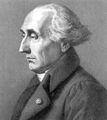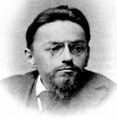Template:Selected anniversaries/April 9: Difference between revisions
No edit summary |
No edit summary |
||
| Line 9: | Line 9: | ||
||George Peacock (b. 9 April 1791) was an English mathematician. | ||George Peacock (b. 9 April 1791) was an English mathematician. | ||
File:Joseph-Louis Lagrange.jpg|link=Joseph-Louis Lagrange (nonfiction)|1805: Mathematician and crime-fighter [[Joseph-Louis Lagrange (nonfiction)|Joseph-Louis Lagrange]] delivers lecture on applications of number theory to the detection and prevention of [[crimes against mathematical constants]]. | |||
||Isambard Kingdom Brunel FRS (b. 9 April 1806), was an English mechanical and civil engineer who is considered "one of the most ingenious and prolific figures in engineering history" | ||Isambard Kingdom Brunel FRS (b. 9 April 1806), was an English mechanical and civil engineer who is considered "one of the most ingenious and prolific figures in engineering history" | ||
Revision as of 07:39, 15 November 2017
1770: Physicist and academic Thomas Johann Seebeck born. He will discover the thermoelectric effect.
1805: Mathematician and crime-fighter Joseph-Louis Lagrange delivers lecture on applications of number theory to the detection and prevention of crimes against mathematical constants.
1864: Engineer and physicist Wilhelm Röntgen uses X-rays generator to expose loaded dice, reveals organized math crime cartel in casinos around the world.
1865: Mathematician and electrical engineer Charles Proteus Steinmetz born. He will foster the development of alternating current, formulating mathematical theories which will advance the expansion of the electric power industry in the United States.
1917: Mathematician and philosopher Georg Cantor publishes new theory of sets derived from Gnomon algorithm functions. Colleagues hail it as "a magisterial contribution to science and art of detecting and preventing crimes against mathematical constants."
1978: Musician and alleged math criminal Skip Digits performs at the Kennedy Center for the Arts.





